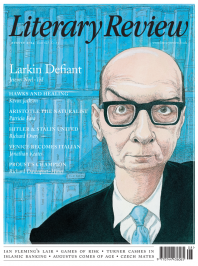Christopher Coker
Fighting Fit
War: What Is It Good for? The Role of Conflict in Civilisation, from Primates to Robots
By Ian Morris
Profile Books 495pp £25
‘Men make a wilderness and call it peace.’ If we only had that epigram from Agricola and nothing else of Tacitus’s work, it would be worth it. In its sentiment, if not its expression, it is typically Tacitean. Tacitus puts the words in the mouth of Calgacus, a British chieftain for whom there is no philosophy to extract from them – but there is for Ian Morris. Pacification, says Morris, is a form of peace, even if, as Tacitus reminds us, peace can be ruinously destructive.
Morris begins with Tacitus and his father-in-law Agricola’s victory against barbarians at the Battle of the Grampian Mountains in AD 83, a confrontation ‘at the edge of the world’. The Stoic philosopher Seneca saw the Roman Empire as a moral concept – the frontier was a moral barrier between people

Sign Up to our newsletter
Receive free articles, highlights from the archive, news, details of prizes, and much more.@Lit_Review
Follow Literary Review on Twitter
Twitter Feed
The son of a notorious con man, John le Carré turned deception into an art form. Does his archive unmask the author or merely prove how well he learned to disappear?
John Phipps explores.
John Phipps - Approach & Seduction
John Phipps: Approach & Seduction - John le Carré: Tradecraft; Tradecraft: Writers on John le Carré by Federico Varese (ed)
literaryreview.co.uk
Few writers have been so eagerly mythologised as Katherine Mansfield. The short, brilliant life, the doomed love affairs, the sickly genius have together blurred the woman behind the work.
Sophie Oliver looks to Mansfield's stories for answers.
Sophie Oliver - Restless Soul
Sophie Oliver: Restless Soul - Katherine Mansfield: A Hidden Life by Gerri Kimber
literaryreview.co.uk
Literary Review is seeking an editorial intern.